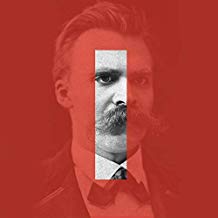
This book calls out to be a movie. That may sound a little startling to say, given that it’s a biography of a philosopher. But Prideaux places you in Nietzsche’s mind and life so clearly you understand his struggles and drive for truth in personal as well as philosophical, social and historical terms. In fact, as a reader today, you feel grateful for it and inspired to read his work for its current relevance. The quotes she uses from Nietzsche are so clear they give liberating pleasure. Given that this is a history of a philosopher’s journey, it’s remarkable how she keeps you within the human beings involved—and particularly in how she follows Nietzsche’s marvelously integrous drive through one veil of illusion after another. Philosophy becomes not only urgently useful but essential to living a true life. As he comes to acknowledge the Nothingness people so strenuously avoid, one can easily see that German society at the time, structured as it was on protestant Christian religion, was doomed. One understands that a philosophical / spiritual crisis predicts an actual psychological / social crisis. The true philosopher, a mind that is free, is a compass, by which one can detect a true direction. Nietzsche showed how we worship illusion and spectacle. That condemns us to falling into conventional sentiments that rob us of real feeling and, socially, devolving into obsolete structures that will no longer work. The relevance of his insights into our increasingly tribal, illusion-worshipping world are frightening.
Sometimes the people around Nietzsche are so hilarious, sometimes so jealous, vindictive, racist, narrow-minded and vain, Nietzsche stands alone. He, of course, doesn’t completely escape being ridiculous, although his harrowing health problems account for much of this impression. All these people are intricately entangled in a society about to suffer catastrophic change. Their adherence to one sort of illusion or another, such as the Pure German Race ideal that Nietzsche’s sister pursued with her husband (he saved her from spinsterhood and she provided the money), as they tried to establish their Teutonic utopia in Paraguay, only leads to more delusion. In that case, the realities of the jungle worked on the colonists, who hoped to realize their dream of pure Germanic identity, until they become pathetic creatures out of sync with the nature around them. The husband, once a charismatic, blond Siegfried, wasted away and eventually killed himself.
One might except Wagner from social blindness, who viewed his work as revolutionary and offering an alternative to mediocrity and materialism, but his addiction to an identity that kept him in constant financial trouble eventually compromised his vision and narrowed his music to become used as a vehicle for nationalistic purposes.
Through his new opera form [the Ring cycle,] Wagner imaged himself purging German culture of alien elements, specifically, anything French and anything Jewish. p.71
Nietzsche abhorred nationalism, and the anti-semitism that went with it. Perceiving that the social structure and belief system he inherited couldn’t go on, he mercilessly and unsentimentally knocks out the underpinnings of Western Culture. He emerges, amid all the ignoble motives people around him display, as a peculiar sort of hero: a man who not only thinks for himself but sees clearly enough to open new paths of thought and identity. Endearingly, however, he refused to replace an obsolete system with one of his own. He thought of himself as the philosopher of Perhaps, leaving others to fulfill themselves according to their own light. He said he’d rather be thought of as a buffoon than a saint. He was a torch, a sort of trickster, surrounded by hypocrisy and guile, doggedly seeing through compromises that trapped people in delusion.
I felt I was in good hands, with this biographer. She has thoroughly digested primary and secondary and even tertiary archival documents, unsentimentally sees the development of Nietzsche’s thought, understands its social relevance to his times, and makes philosophy live beyond the boundaries of the Academy. It becomes not only important, but necessary to the ordinary person. In Nietzsche’s view the pursuit of truth was predicated on the difficult practice of what he called selbstüberwindung, or self-overcoming. He treasured all his life a line from Pindar’s Pythian Odes: “Become what you are, having learned what that is.”
I AM DYNAMITE! : A Life of Nietzsche
by Sue Prideaux (Tim Duggan Books 2018)
422 pages

Leave a Reply